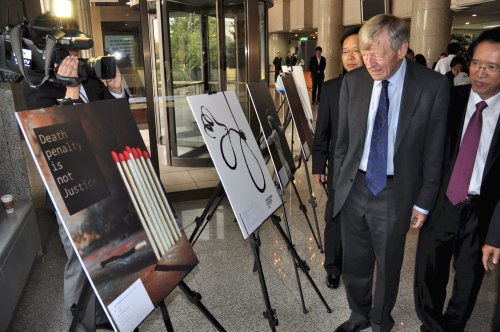Capital punishment causes heated discussions no matter the side of the debate.
In England and all but one European country, the death sentence has been abolished.
“To take life in the name of the state seems to me wrong, it degrades the state, it doesn’t lead to respect for human rights, and indeed most of the countries that use the death penalty on a large scale are dictatorships,” said Lord Alf Dubs, an active member in the British House of Lords.
Lord Dubs was in Seoul as part of the British government’s campaign against the death penalty.
Korea is one of four developed industrialized democracies that still have the death penalty on its books; the others are the United States, Japan and Taiwan.
Both Japan and Taiwan executed prisoners last year while Korea has not done so since Dec. 31, 1997, when 23 people were put to death.
But death sentences are still handed down, most recently on April 21, 2009, when Kang Ho-sun was convicted for the murder of ten people.
“When you have a country that does respect human rights like Korea, it is right that the death penalty should be taken off the books, especially when it’s not being used,” stressed Lord Dubs.
 |
Lord Alf Dubs reflects on the message conveyed on one of the posters at the Amnesty International poster exhibition against capital punishment at the National Assembly last week. (Yoav Cerralbo/The Korea Herald) |
In Europe, capital punishment has been abolished by every country except for Belarus, which voted overwhelmingly to keep it in a referendum in 1996. It is one of the obstacles keeping the country out of the Council of Europe.
The removal of capital punishment from a nation’s legal system is a prerequisite to joining the European Union.
The most recent case is Turkey which abolished the death penalty as a preliminary to negotiations for ascension into the 27-member bloc.
There are many reasons why people oppose capital punishment.
England’s legal system dodged a bullet when in 1975, the Birmingham Six, accused of a series of bombings in Birmingham, were not executed and later found to be innocent.
“Executing the wrong person is a strong argument against the death penalty; we’ve seen this happen in many countries,” he said. “But I think the more powerful argument is that the state should not execute in the name of the state.”
Spreading the word against capital punishment to other countries is tricky according to Lord Dubs.
“I’m here to exchange views and where abolitionists invite me, then I’m happy to respond. It’s not good to preach to the converted, one has to spread the word more widely.”
Lord Dubs and the British Foreign Office believe that their experiences can be shared with those in countries who are looking to abolish the death penalty.
“The death penalty doesn’t work as a deterrent,” he said. “It’s wrong to use it in terms of the value of a society.”
Yet countries that support capital punishment say the death penalty gives closure to the victim’s families, creates another deterrent to crime and provides a deterrent for prisoners already serving a life sentence.
Korea’s highest court upheld the death penalty in a 5-4 decision in February 2010.
The Ministry of Justice announced that it is considering replacing the death penalty with life without parole, a move that the ministry says stems from concerns about human rights.
Amnesty International has classified Korea as “abolitionist in practice.”
The road to end the death penalty in Korea started in 1998, when former President Kim Dae-jung, a former death row prisoner, halted executions.
By Yoav Cerralbo (
yoav@heraldcorp.com)








